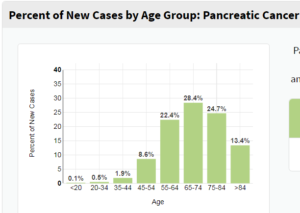
If children can get pancreatic cancer, just how many actually develop this disease? And what should parents look out for?
“I have not seen this in my career,” says Robert Saul, MD, a board certified pediatrician for 40+ years and Professor of Pediatrics at Prisma Health Children’s Hospital and the University of South Carolina School of Medicine.
Dr. Saul adds, “But yes, children can get pancreatic cancer.”
In fact, even infants can be diagnosed with pancreatic cancer – a disease that can strike at any age.
However, “can” does not mean that parents should worry that their child might have pancreatic cancer.
Certainly, if one’s child is experiencing new and unexplained symptoms, they should be seen by a pediatrician.
Let the pediatrician take it from there, and do not worry about a disease that has an incidence of 0.46 cases per one million people under age 30.
The median age of diagnosis is 70, but one tenth of a percent of cases occur in people under the age of 20. Again, this includes babies.
See the chart below from the National Cancer Institute Surveillance, Epidemiology and End Results Program for number of diagnosed cases per age bracket.

The Journal of Pediatric Surgery has covered the phenomenon of pancreatic cancer in children.
In one paper, one particular medical institution had six cases of pediatric pancreatic neoplasms between 1971 and 1991.
So it’s exceedingly rare, but not impossible, for this age group to get this very difficult to treat disease.
The six patients were between three weeks old and 16 years.
There are different kinds of pancreatic cancer. In the case of these young patients, there were one insulin-secreting tumor, one pancreatoblastoma and three solid cystic tumors.
The paper reports that surgery was the only treatment, and that the young patients were all alive on an average of 7.8 years later.
Another paper of the same journal but different issue reports on 58 patients having either an exocrine type of tumor, endocrine type or sarcoma.
The pancreatoblastoma was more commonly seen in kids under 10 years.
About half the 58 patients had metastatic disease, and 44 percent of these entailed the endocrine type.
Don’t Ignore Symptoms
If your child starts having abdominal pain, nausea or fatigue, you certainly do not want to start fearing that he or she might have pancreatic cancer.
It really is just so unlikely.
But DO take your child to their pediatrician to find out what’s behind these or any other new symptoms.

 Dr. Saul is the coauthor of “Thinking Developmentally: Nurturing Wellness in Childhood to Promote Lifelong Health,” and author of “Conscious Parenting: Using the Parental Awareness Threshold.” His website is mychildrenschildren.com.
Dr. Saul is the coauthor of “Thinking Developmentally: Nurturing Wellness in Childhood to Promote Lifelong Health,” and author of “Conscious Parenting: Using the Parental Awareness Threshold.” His website is mychildrenschildren.com.
























